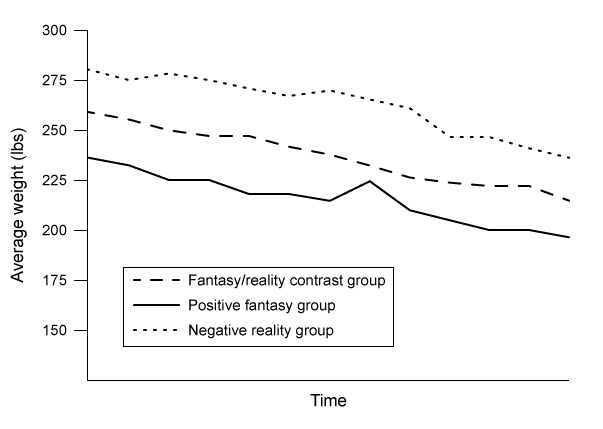Passage Health Psychologists Interested in Studying the Influence of Positive and and Negative
Passage
Health psychologists interested in studying the influence of positive and negative thinking on weight loss conducted a study on 120 obese adults attempting to lose weight. Participants indicated on a scale of 1 to 7 how successful they thought they would be at losing weight (1 = "not successful" and 7 = "very successful") and how much control they believed they had over their success (1 = "no control" and 7 = "complete control") , recorded as expectation of success scores and control of success scores, respectively.Participants were then randomly divided into three groups and asked to complete a 15-minute guided mental exercise twice a day for three weeks. Participants in the fantasy/reality contrast condition were instructed to reflect on two positive aspects of a fantasized weight loss, such as attaining better health and more energy, and two negative aspects of reality that impede weight loss, such as lack of discipline and desire to eat unhealthy foods. Participants in the positive fantasy condition were asked to reflect on four positive aspects of weight loss, and participants in the negative reality condition were asked to reflect on four factors that impede weight loss.At the end of this three-week period, participants began a three-month diet and exercise regimen involving caloric restriction to 1,500 calories per day as well as regular participation in aerobic exercise and weight training. Researchers recorded weekly weights of participants and surveyed participants regarding adherence to proactive weight loss strategies. The results are shown by group in Figures 1 and 2.
 Figure 1 Average weight recorded for each group during three-month follow-up
Figure 1 Average weight recorded for each group during three-month follow-up
 Figure 2 Initial expectation of success score versus average weight loss
Figure 2 Initial expectation of success score versus average weight loss
-Which of the following proactive weight loss strategies is most consistent with drive-reduction theory?
A) Keeping a daily food journal to record all calories consumed
B) Using new clothes as a weekly reward for weight loss
C) Engaging in cardiovascular and strength-training exercises
D) Eating food more slowly and mindfully, and stopping when full
Correct Answer:
Verified
Q113: Passage
Trait theorists believe that all people have
Q114: Passage
People tend to believe that they are
Q115: Passage
Health psychologists interested in studying the influence
Q116: Passage
Health psychologists interested in studying the influence
Q117: Passage
People tend to believe that they are
Q119: Passage
The last several decades have seen a
Q120: Passage
Trait theorists believe that all people have
Q121: Passage
Post-traumatic stress disorder (PTSD) and generalized anxiety
Q122: Passage
Numerous studies suggest that physicians make both
Q123: Passage
Twenty-two adults (mean age 49.5) were recruited
Unlock this Answer For Free Now!
View this answer and more for free by performing one of the following actions

Scan the QR code to install the App and get 2 free unlocks

Unlock quizzes for free by uploading documents